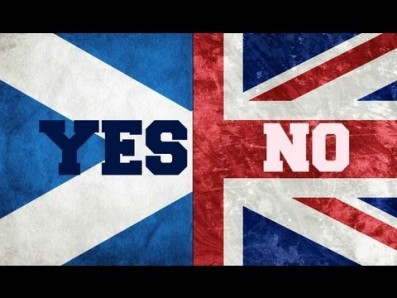
While Spain and the EU have no say in Scottish independence claims, they could influence an Independent Scotland’s future
The ongoing secessionist movements in Spain mean that it is ‘highly probable’ that the country would vote to block Scotland’s entry to the EU should the Scots vote in favour of independence at this month’s referendum.
Fears that an independent Scotland gaining access to the European Union would inspire Catalan and Basque claims for independence from Spain mean that the Spanish government will be watching the results of the September 18 vote closely…
Spain – and Belgium, which is also wrestling with its own secessionists – has diplomatically refused to be drawn into the debate, but a former president of the EU’s finance council has remarked that the country will secretly hope the Scots vote no.
Ruairi Quinn is now a politician in his native Ireland, and he believes that Spain and Belgium would exercise their right to veto new EU members should Scotland gain independence and – in all likelihood – seek EU membership.
“In my opinion, it is highly probable that at least two member states, maybe more, will vote no,” said Quinn. “Spain will not want to create the precedent of a region deciding to leave and join the EU in their own right, while Belgium is extremely worried that a Scottish precedent would encourage the now very rich region of Flanders to secede from the Kingdom. This would impoverish Belgium.”
In Spain, Catalan claims for independence have been vocal and regular for decades. The Catalans’ regional wealth is greater than the Spanish average, prompting greater calls for the option to go it alone. Madrid, however, has so far refused to entertain the notion. The Basque claim for independence goes even farther back, and has regularly descended into an unedifying campaign of terrorism and bloodshed on the part of Basque separatists, ETA.
Quinn added that Scottish independence would “really encourage Catalonia and the Basque Country to agitate for secession from Spain.”
Officially, Spanish politicians have always declared that they would give “full consideration” to the entry of an independent Scotland, provided their claim for EU membership was legal.

Around half of all Catalans are in favour of breaking away from Spain
One key distinction between the two issues, believes Barcelona-based EU expert Carmo Colomina, is that Catalonia’s claims for independence have been “dragged along” by the will of the people.
“In Scotland we have seen a political party push for a vote on independence, where in Catalonia the regional government has been led by the people,” she told The Local.
“In the end, the EU is more likely to accept Catalonia as an independent nation if there has been a negotiated agreement with Spain.”
Should Catalonia ever gain independence from Spain, EU guidelines state that the newly formed nation would have to reapply for membership – something that Spain is unlikely to vote in favour of.
Catalonia will go to the polls on November 9th for a referendum on whether to split from the rest of Spain – a vote that Madrid has declared illegal and in no-way binding. Recent polls have suggested that 45 per cent of Catalans would vote in favour of independence.
Over in the UK, the matter is entirely different, with the September 18 vote having the potential to divorce, perhaps once and for all, the United Kingdom and Scotland. Spain, and especially the Catalans, will be watching proceedings very closely…
 en
en



 Vlaams-Nederlands
Vlaams-Nederlands
0 Comments
Leave a Comment
DISCLAIMER
The opinions and comments expressed by contributors to this Blog are theirs alone and do not necessarily reflect the views of VIVA Homes Under the Sun Ltd, any of its associated companies, or employees; nor is VIVA to be held responsible or accountable for the accuracy of any of the information supplied.
Have you got something to say?